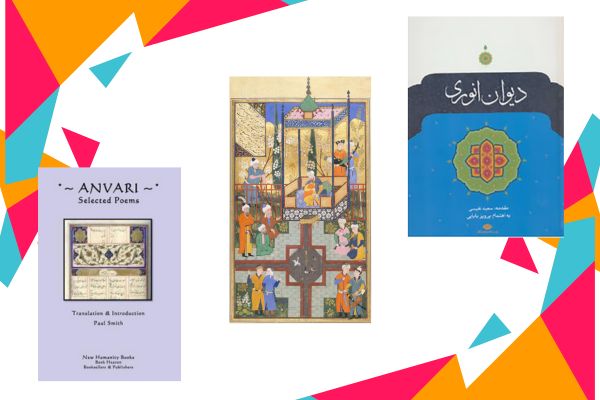Anvari Abivardi (c. 1126 – c. 1189 CE), born as Awhad al-Din Ali ibn Mohammad, was one of the most distinguished Persian poets of the medieval period, renowned for his brilliant panegyrics and philosophical depth. He was born in Abivard, Khorasan (in modern-day Turkmenistan or Iran), during the Seljuk era, and rose to prominence as a court poet celebrated for his mastery of the qasida (ode) form. His poetry is marked by its intellectual rigor, sharp wit, and intricate imagery.
Early Life and Education
Anvari received a comprehensive education in the sciences and humanities, excelling in mathematics, astronomy, and literature. His profound knowledge of these subjects often informed his poetry, giving it a unique blend of intellectual depth and artistic brilliance. Anvari initially served as an astrologer but soon transitioned to poetry, where his talent for crafting eloquent and sophisticated verse gained widespread acclaim.
Career and Patronage
Anvari became a court poet, writing panegyrics for Seljuk rulers and other patrons. His qasidas praised the rulers' virtues, military victories, and generosity, earning him a prestigious position in the courts. However, Anvari’s relationship with his patrons was not always harmonious. His sharp tongue and satirical wit occasionally led to tensions, and some of his poems reflect disillusionment with the courtly life.
Poetic Style and Themes
Anvari’s poetry is characterized by its complexity, erudition, and emotional intensity. Key features of his work include:
- Courtly Praise: Lavish qasidas glorifying patrons and rulers, often blending historical events with poetic exaggeration.
- Philosophical Reflection: His poems delve into existential questions, the transience of life, and the mysteries of the universe.
- Satire and Criticism: Anvari was unafraid to criticize social and political corruption, showcasing his sharp wit and fearless spirit.
- Nature Imagery: Vivid depictions of landscapes, seasons, and natural phenomena.
- Technical Mastery: Anvari’s use of language, intricate metaphors, and rhythmic precision set a high standard for Persian poetry.
One of his most famous works is his Elegy on the Ruin of Balkh, a poignant reflection on the devastation wrought by war and the fragility of human achievements.
Astronomy and the Satirical "Anti-Ode"
Anvari’s expertise in astronomy is evident in his poetry, where celestial imagery often plays a significant role. One of his notable works is a satirical ode written after his failed prediction of a cosmic disaster, where he humorously mocks his own error and critiques the expectations placed upon him as an astrologer.
Later Life and Death
Disillusioned with courtly life, Anvari retired from public service and spent his later years in relative seclusion. He continued to write poetry, including ghazals (lyric poems) and rubaiyat (quatrains), which explore themes of love, mysticism, and the fleeting nature of existence.
Anvari passed away around 1189 CE. Despite his occasional controversies, he left behind a rich poetic legacy that influenced later Persian poets, including Saadi and Hafez.
Legacy
Anvari is regarded as one of the greatest masters of the qasida form in Persian literature. His works, particularly his panegyrics and philosophical musings, have been admired for their intellectual depth, artistic complexity, and timeless relevance. While some criticized his occasional arrogance and cryptic style, his enduring influence on Persian poetry is undeniable. Today, Anvari’s poems are celebrated for their brilliance and remain a significant part of Persian literary heritage.
Sokhanvar information
Published on Dec. 27, 2024, 7:20 p.m. by @admin
- Name: Awhad ad-Din 'Ali ibn Mohammad Khavarani
- Persian Name:: اوحدالدین علی ابن محمد انوری
- Alias: Anvari
- Comments: 0
- Views: 1031
Works
Divan of Anvari

